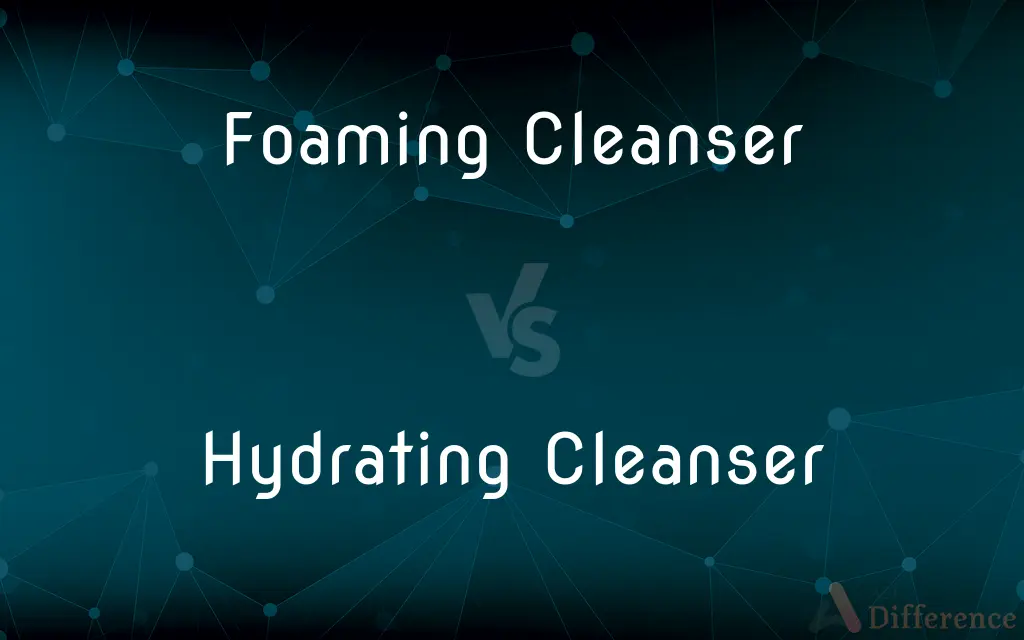Foaming Cleanser vs. Hydrating Cleanser — What's the Difference?
By Urooj Arif & Fiza Rafique — Published on August 24, 2024
Foaming cleansers effectively remove excess oil and impurities with a lather, ideal for oily or acne-prone skin. Hydrating cleansers, typically non-foaming, gently cleanse without stripping moisture, best for dry or sensitive skin types.

Difference Between Foaming Cleanser and Hydrating Cleanser
Table of Contents
ADVERTISEMENT
Key Differences
Foaming cleansers are characterized by their ability to create a rich lather, which helps in thoroughly cleansing the skin by removing dirt, oil, and makeup. Their formulation often contains surfactants that facilitate the removal of debris from the skin's surface, making them particularly suited for individuals with oily or acne-prone skin.
Hydrating cleansers, in contrast, are designed to cleanse the skin while preserving its natural moisture barrier. These types of cleansers are usually cream or gel-based and contain moisturizing ingredients like glycerin or hyaluronic acid, making them ideal for dry or sensitive skin types.
The main difference lies in the ingredients and the intended skin type. Foaming cleansers might include ingredients that can strip the skin of its natural oils, which can be beneficial for controlling excess sebum but potentially drying for those with already dry skin. Hydrating cleansers, on the other hand, are formulated to avoid stripping the skin, instead adding moisture back into the skin to maintain its hydration levels.
Another aspect to consider is the pH level of the cleansers. Foaming cleansers may have a higher pH, which can disrupt the skin's natural pH balance, leading to potential irritation or dryness. Hydrating cleansers are often carefully pH-balanced to match the skin's natural levels, thereby minimizing the risk of irritation and supporting the skin's protective barrier.
The choice between a foaming and hydrating cleanser also depends on personal preference and the specific skincare routine. Some may prefer the feeling of cleanliness that comes with a foaming cleanser, while others might prioritize the gentle, nourishing effect of a hydrating cleanser.
ADVERTISEMENT
Finally, it's important to consider the time of year and environmental factors. Those with combination skin might opt for a foaming cleanser in humid, warm months and switch to a hydrating cleanser during colder, drier seasons to adapt to changing skin needs.
Comparison Chart
Ideal Skin Type
Oily or acne-prone skin
Dry or sensitive skin
Key Ingredients
Surfactants for removing oil and impurities
Moisturizing ingredients like glycerin, hyaluronic acid
Texture
Light and airy lather
Creamy or gel-like, without significant lather
PH Level
Often higher, can disrupt skin's natural balance
Closer to skin's natural pH, less likely to irritate
Result
Thoroughly cleanses, may strip natural oils
Cleanses gently, preserves or adds moisture
Compare with Definitions
Foaming Cleanser
A cleanser that lathers to remove excess oil and impurities.
After using the foaming cleanser, her face felt deeply cleansed and refreshed.
Hydrating Cleanser
Contains moisturizing ingredients.
Glycerin in the hydrating cleanser helped her skin stay moisturized.
Foaming Cleanser
Can strip natural oils if overused.
She noticed her skin became too dry when she used the foaming cleanser twice a day.
Hydrating Cleanser
Matches skin's natural pH level.
The low pH of the hydrating cleanser kept her sensitive skin from getting irritated.
Foaming Cleanser
Often has a higher pH level.
The foaming cleanser's higher pH helped control her oily skin.
Hydrating Cleanser
A gentle cleanser that maintains skin's moisture.
Her skin felt soft and hydrated after using the hydrating cleanser.
Foaming Cleanser
Suited for oily or acne-prone skin.
His acne improved after he switched to a foaming cleanser.
Hydrating Cleanser
Ideal for dry or sensitive skin.
The hydrating cleanser was a game-changer for his dry, flaky skin.
Foaming Cleanser
Preferred for thorough cleansing.
For heavy makeup days, a foaming cleanser was her go-to choice.
Hydrating Cleanser
Chosen for its nourishing properties.
In winter, she always switched to a hydrating cleanser to combat dryness.
Common Curiosities
Can a hydrating cleanser remove makeup?
Yes, many hydrating cleansers can effectively remove makeup while keeping the skin moisturized.
Are foaming cleansers bad for dry skin?
They can be overly drying for dry skin types, stripping away natural oils needed for moisture.
How do I know if a cleanser is hydrating?
Look for key moisturizing ingredients listed, such as glycerin or hyaluronic acid, and a creamy or gel texture.
Is a tingling sensation normal with foaming cleansers?
A mild sensation can be normal, but intense tingling or burning indicates the product may be too harsh for your skin.
How often should I use a hydrating cleanser?
Daily, as part of both morning and evening skincare routines, to maintain skin hydration.
Are hydrating cleansers effective for removing sunscreen?
Many are effective, but for water-resistant formulas, a double-cleansing method may be recommended.
Can I use both a foaming and hydrating cleanser?
Yes, some choose to use a foaming cleanser in the morning or after workouts and a hydrating cleanser at night.
Why might someone switch cleansers seasonally?
Skin needs can change with the weather, requiring more moisture in winter and more oil control in summer.
Who should use a foaming cleanser?
Individuals with oily or acne-prone skin benefit most from foaming cleansers.
How does the pH of a cleanser affect skin health?
Cleansers with a pH similar to the skin's natural pH (around 4.7 to 5.75) are less likely to disrupt the skin barrier and cause irritation.
Do hydrating cleansers cause acne?
Properly formulated hydrating cleansers should not cause acne, even for those with oily skin types.
Can sensitive skin benefit from a hydrating cleanser?
Absolutely, as these cleansers are formulated to minimize irritation and support the skin's natural barrier.
Can using a foaming cleanser improve acne?
Yes, by removing excess oil and debris that can clog pores, it may help improve acne.
Should I follow up a foaming cleanser with a moisturizer?
Yes, to replenish moisture and protect the skin barrier, especially if the skin feels tight after cleansing.
Is it necessary to use a cleanser specific to my skin type?
While not always necessary, choosing a cleanser suited to your skin type can optimize your skincare routine's effectiveness and comfort.
Share Your Discovery

Previous Comparison
Carbon Steel vs. Stainless Steel
Next Comparison
Control Group vs. Experimental GroupAuthor Spotlight
Written by
Urooj ArifUrooj is a skilled content writer at Ask Difference, known for her exceptional ability to simplify complex topics into engaging and informative content. With a passion for research and a flair for clear, concise writing, she consistently delivers articles that resonate with our diverse audience.
Co-written by
Fiza RafiqueFiza Rafique is a skilled content writer at AskDifference.com, where she meticulously refines and enhances written pieces. Drawing from her vast editorial expertise, Fiza ensures clarity, accuracy, and precision in every article. Passionate about language, she continually seeks to elevate the quality of content for readers worldwide.













































